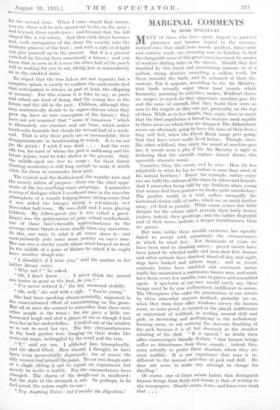MARGINAL COMMENTS
By ROSE MACAULAY •
MANY of those who have spent August in pastoral • .1.Y.1 pleasures, and become inured to the raucous, rustical cries that shrill from woods, gardens, farm-yards and country roads, are returning now to London, to find the chargeable noise of this great town increased by armies of workers drilling holes in the streets. Should they feel troubled by this harsh and penetrating rumour, as of. a ,million strong dentists . assaulting a million teeth, let them consider the birds, and be ashamed of their. dis- content. For it appears, according to the Air Ministry, that birds actually. enjoy—those loud sounds which humanity, pursuing its activities, makes. Wildfowl thrive on ranges; so much do they appreciate machine-gun fire and the noise of aircraft, that they build their nests :as near to the targets as they can get, preferably on the top of them. While as to live, bombs, they enjoy these so much that the bird population is. found to increase most rapidly in those areas on which they are dropped. The Abbotsbury swans are obviously going to have,the time of. their lives ; they will feel, when the Chesil. Bank range gets going, that they have never really lived. before. Though, since, like other wildfowl, they enjoy the sound of machine-gun fire, it would seem a pity if the Air Ministry is right iii declaring that the aircraft engines almoSt drown this agreeable staccato music. Consider, then, the swans-, and be wise. How far less adaptable to what. he has to endure is man than most .of his animal brethren ! Foxes, for example, rather .enjoy (we are told) the ardours of the chase by riders and hounds. And I remember being told by mr.brothers when young that worms find their piostiusressaoid, suffers the The poultry world, it nocturnal clarion Calls of cocks, which we, so much farther away, yet find so painful. While swine evince but little distaste for the odours which pervade their lowly homes (unless, indeed, their gruntings, and; the-rather .disgusttd curl of their .noses, indicate a deeper: fastidiousness than we guess). circumstances in.But man, unlike these sensible creatures, has signally failed to accept with the en ds of ymatr in. which lie must live. thousands have been used to shocking •noises : paved streets.have been jarred by wheeled traffic and iron-shod feet; human and other animals have shrieked aloud all day and night, dogs have barked and infants: wept ; , and in recent centuries trains have rumbled and screamed, motor traffic has maintained a continuous hoarse roar, and roads have been, every few months, torn to pieces and assembled again. A spectator of our race would surely say,, these beings must be by now acclimatised, indifferent to noises. The Olympians who order the penetration of our, streets by these somewhat raucous methods probably see us, when they from their office windows survey, the human scene, as noise-proof, as steeped in the placid indifference or enjoyment of wildfowl, as nesting around drill and pick, as increasing and multiplying in the melodiously buzzing areas, as not noticing the staccato thudding of the pick because it is all but ,drowned in the steadier whirring of the drill. " It is agreed," no doubt their office communiqués blandly declare, " that human beings • suffer no disturbance from these sounds ; indeed, they seem actually to prefer those districts where they are most audible. It is our experience that man is in- different to the normal activities of pick and drill. He does not seem to make any attempt to change his dwelling." Of course, one of. those minor habits that distinguish human beings from birds. and beasts. is that of writing to the newspapers. Should swans, terns, and foxes ever start that . . .


































 Previous page
Previous page